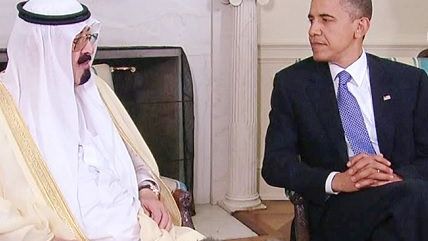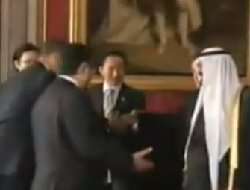Saudi Arabia Upset With Not Aggressive Enough US Foreign Policy, Not Taking Security Council Seat, Still Lobbying to Get on Human Rights Council
Threatening to "scale back" partnership with the US


Saudi Arabia wants the US to know it's been upset about its reluctance to act more aggressively on Syria, its intelligence chief telling European diplomats the country would no longer work with the US on covertly (secret!) arming Syrian rebels. The intel chief, Prince Bandar bin Sultan, also reportedly claimed the US was getting too close to Tehran and didn't back Bahrain when it crushed anti-government protests in 2011. Both Syria and Iran are in a sphere of influence that competes with Saudi Arabia's own. Bahrain, and Saudi Arabia, meanwhile, are American allies, though Saudi Arabia appears now to be threatening to "scale back" its partnership with the US.
Saudi Arabia's first public sign of displeasure in this diplomatic drama came last week when, after a year of lobbying it, the kingdom declined to take a seat on the UN Security Council, citing its disappointment that the Security Council hadn't endorsed an intervention in Syria or dealt with the Israeli-Palestinian issue. The latter is largely rhetoric—Vali Nasr reported in his book that Saudi officials were much more interested in talking about how to contain Iran than resolving the Israeli-Palestinian conflict when it came up.
Though Saudi Arabia is throwing a veritable hissy fit over the US's perceived lack of interest in intervening militarily in Syria as well as recent progress made between Western powers and Iran over its contentious nuclear program, the Arab kingdom is hardly disengaging from the international system. In 1950, the Soviet Union boycotted the UN Security Council over its decision to award China's seat on the body to the Republic of China in Taiwan and not the government in Beijing. That boycott ended when the UN Security Council, without the USSR there to veto it, passed a resolution authorizing the Korean war against communist forces on that peninsula. Saudi Arabia would have no veto power on the Security Council, so its boycott is far more low-stakes. Without US support, its diplomatic position on the council would be weak.
On the other hand, Saudi Arabia is continuing its campaign for a seat on the UN Human Rights Council, even though the fact that UN Secretary General Ban Ki Moon wasn't aware of its decision to decline a Security Council seat isn't going to help. That political angle will probably carry more weight against Saudi Arabia's campaign then its own human rights abuses, highlighted by the Human Rights Council itself just last week. Countries with spotty records like Venezuela and Kazakhstan, are on the council now, and Saudi Arabia has sat on it before.
Saudi Arabia receives just $9,000 in foreign aid from the US a year, though the US does sell it a lot of military hardware. In 2010, the US made the largest arms sale in its history, selling $60 billion's worth of jets and attack helicopters to the Arab kingdom. Saudi Arabia is also a major exporter of oil to the US, though its highly unlikely OPEC would support a slow down or boycott over the kingdom's political gripes with the US. Neither arms deals nor its status as an oil rich country should deter the US from responding in kind to Saudi Arabia and disengaging as that country's ally and strongman in the region.
